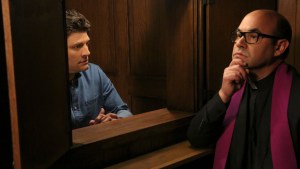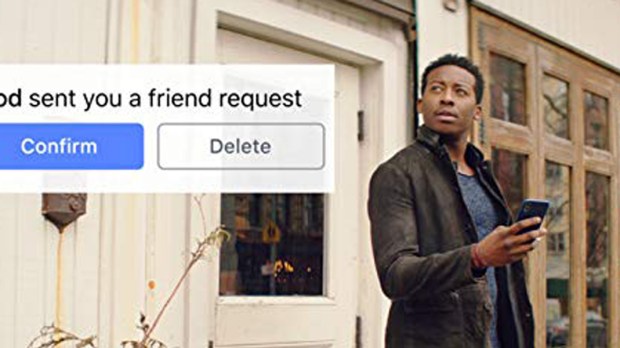Back when he was just a little tyke, Brandon Micheal Hall and his mom would watch Seventh Heaven or Touched By an Angel together. Those stories hit pretty close to home: Brandon’s mom was a pastor and he grew up in the church. He was inspired to get up on stage, in part, because of the preachers he watched. Those inspirational, faith-heavy shows were just more spiritual touchstones in a life already filled with them.
That was 20 years ago. The America of today is a more cynical place, and less religious. About 15 percent of Hall’s Millennial generation claims to be either atheist or agnostic, according to Barna research. Another 15 percent have no religious identity at all. Certainly television — prone to avoid polarizing plot-points in its collective quest for viewers — would be far less prone now to embrace the inherently complicated and controversial subject of religion, right?
Yeah, not so much.
If religion’s waning in the culture, it’s waxing on one of its most important platforms. Faith can serve as a problematic plot point (as in USA’s The Sinner, for instance, or even HBO’s Game of Thrones), a thematic thread (NBC’s new show Manifest), a setting for drama (OWN’s Greenleaf) or a catalyst for laughs (NBC’s The Good Place). And even in the 21st century, television sometimes unfurls a show that feels like a throwback to a more innocent age. One that suggests that faith can be both true and beautiful.
Take Brandon Micheal Hall’s own God Friended Me, for example.
In the CBS show, Hall’s character — a guy by the name of Miles Finer — is a Millennial atheist who literally broadcasts his unbelief. On his fledgling podcast, Miles serves as its titular “Millennial Prophet,” telling his listeners that “There is no God and that’s okay.”
But Miles’ unbelief takes a hit when he gets a Facebook friend request from God — or, at least, someone pretending to be Him. With the help of journalist Cara Bloom, a still cynical Miles embarks on a quest to uncover the online troll’s identity. But along the way, Miles discovers that life is not quite as empirical as he might’ve thought — that a divine plan may be at work in his life.
Miles begins to open the door to questioning his own lack of faith in the pilot episode (which technically premieres tomorrow night, even though you can watch the first episode now online):
Aleteia participated in a roundtable conversation with Hall this month and during the interview, he admitted that playing an atheist was a stretch for him. But, he added, “I like taking on roles that are uncomfortable.”
Even if Hall doesn’t share Miles’ beliefs, though, he has high ambitions for the show itself. “I want … to spark a conversation,” he says — a conversation he believes is very much needed today. And he wants to make the idea of faith feel both important and relevant to the audience.
“The (purpose) of this show is to make it as real as possible,” he says. Thus, the uncertainty of who “God” really is in the show: No supernatural beings, a la Touched By an Angel. The problems are real-world fare, too. The questions about and challenges to faith here are messy, and when we learn why Miles lost his religion in the first place … well, some of us might sympathize.
Hall believes that asking questions about one’s faith is an important part of faith itself. He admits he wishes he had more freedom to ask spiritual questions when he was younger, and he believes that parents should help create a safe space to ponder those sometimes difficult queries. “Free them up to ask questions,” he suggests. Sure, make sure that they’re “protected, that they’re fed, that they’re healthy. … But that doesn’t mean that they can’t explore [questions], and even bring something back to you and teach you something as well.”
That’s a good rule of thumb when you’re talking about faith with peers, too, Hall believes: Come into conversations with an open hand, not a closed fist. “The more you push your ideas on someone else,” he says, “[sometimes] the more that person pushes away.”
The show takes place in New York, where Hall says that “every single religion known to man” is not just represented, but potentially right next door. The CBS show embraces that sense of multiculturalism, too: Miles talks with a Jewish rabbi in the pilot episode, and Hall says he’ll be talking with a Muslim family in a future one. Hall wants God Friended Me to strike the right balance — about being honest about the messy realities of life and faith while still embracing its core inspirational nature — “those elements of hope, the positivity,” he says.
“I think my eight-year-old self would be watching this show,” he says — right alongside Seventh Heaven.
The country may be growing more secular. But God Friended Me suggests that faith, and conversations about faith, can be a conduit for growth and goodness even now.
Check out the official trailer below:
https://www.youtube.com/watch?v=BTBaFCANKp0&vl=en

Read more:
Why the creator of ‘Living Biblically’ thinks faith’s moment on TV has arrived

